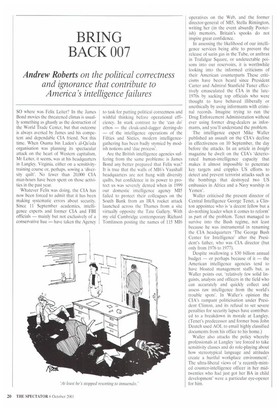BRING BACK 007
Andrew Roberts on the political correctness
and ignorance that contribute to America's intelligence failures
SO where was Felix Leiter? In the James Bond movies the threatened climax is usually something as ghastly as the destruction of the World Trade Center, but that outcome is always averted by James and his competent and dependable CIA friend. Not this time. When Osama bin Laden's al-Oa'eda organisation was planning its spectacular attack on the heart of Western capitalism, Mr Leiter, it seems, was at his headquarters in Langley, Virginia, either on a sensitivitytraining course or, perhaps, sowing a 'diversity quilt'. No fewer than 20,000 CIA man-hours have been spent on those activities in the past year.
Whatever Felix was doing, the CIA has now been forced to admit that it has been making systematic errors about security. Since 11 September academics, intelligence experts and former CIA and FBI officials — mainly but not exclusively of a conservative hue — have taken the Agency to task for putting political correctness and wishful thinking before operational efficiency. In stark contrast to the 'can do' ethos — the cloak-and-dagger derring-do — of the intelligence operations of the Fifties and Sixties, modern intelligencegathering has been badly stymied by modish notions and 'due process'.
Are the British intelligence agencies suffering from the same problems: is James Bond any better prepared that Felix was? It is true that the walls of MI6's Vauxhall headquarters are not hung with diversity quilts, but confidence in its power to protect us was severely dented when in 1999 our domestic intelligence agency MI5 failed to protect their colleagues on the South Bank from an IRA rocket attack launched across the Thames from a site virtually opposite the Tate Gallery. With my old Cambridge contemporary Richard Tomlinson posting the names of 115 MI6 operatives on the Web, and the former director-general of MI5, Stella Rimington, writing her (in the event absurdly Pooterish) memoirs, Britain's spooks do not inspire great confidence.
In assessing the likelihood of our intelligence services being able to prevent the release of sarin gas in the Tube, or anthrax in Trafalgar Square, or undetectable poisons into our reservoirs, it is worthwhile looking into the informed criticisms of their American counterparts These criticisms have been heard since President Carter and Admiral Stanfield Tuner effectively emasculated the CIA in the late1970s by sacking top officials who were thought to have behaved illiberally or unethically by using informants with criminal records. Imagine trying to run the Drug Enforcement Administration without ever using former drug-dealers as informants, and you'll understand the problem.
The intelligence expert Mike Waller published an assault on the CIA's decline in effectiveness on 10 September, the day before the attacks. In an article in Insight magazine he dwelt on the CIA's 'deteriorated human-intelligence capacity that makes it almost impossible to penetrate key targets and cripples US efforts to detect and prevent terrorist attacks such as the bombings that destroyed two US embassies in Africa and a Navy warship in Yemen'.
Waller criticised the present director of Central Intelligence George Tenet, a Clinton appointee who is 'a decent fellow but a do-nothing leader when it comes to reform' as part of the problem. Tenet managed to survive into the Bush regime, not least because he was instrumental in renaming the CIA headquarters 'The George Bush Center for Intelligence' after the President's father, who was CIA director (but only from 1976 to 1977).
Despite swallowing a $30 billion annual budget — or perhaps because of it — the American intelligence agencies tend to have bloated management staffs but, as Waller points out, 'relatively few solid linguists, analysts and officers in the field who can accurately and quickly collect and assess raw intelligence from the world's trouble spots', In Waller's opinion the CIA's rampant politicisation under President Clinton, and its refusal to set severe penalties for security lapses have contributed to a breakdown in morale at Langley. (Tenet's predecessor and former boss John Deutch used AOL to email highly classified documents from his office to his home.) Waller also attacks the policy whereby professionals at Langley 'are forced to take sensitivity classes and do role-playing about how stereotypical language and attitudes create a hurtful workplace environment'. The ultra-liberal views of 'a recently-minted counter-intelligence officer in her midtwenties who had just got her BA in child development' were a particular eye-opener for him. A former senior official in the CIA's Directorate of Operations (DO), Reuel Marc Gerecht, takes a similar view. Having served as a field officer in Peshawar on the Pakistan–Afghan border — 'the Dodge City of Central Asia', as he puts it — where al-Qa'eda was founded and, until recently, has operated more or less openly, he was horrified by the complacency of his bosses back home who, even after the October 2000 suicide attacks on the embassies and USS Cole, claimed that they were 'picking apart' bin Laden's movement 'limb by limb'.
Gerecht warns of the dangers of the CIA's having so few operatives of Middle Eastern background, The Agency depended far too much on Pakistan's Inter-Services Agency, which, though tough and competent, was simply not going to take America's side against alQa'eda with anything like the enthusiasm necessary, America has left her strongmen allies in the lurch too often — witness Thieu, Marcos, Somoza, the Shah, Pinochet — for the Pakistani intelligence services to believe that she will do anything for them once their usefulness in the present crisis is over.
'The only way to run offensive counterterrorist operations against Islamic radicals in more or less hostile territory,' Gerecht warns, 'is with "non-official cover" officers — operatives who are in no way attached to the US government.' Yet, as a former senior Near East Division CIA operative puts it, the Agency 'probably doesn't have a single truly qualified Arabic-speaking officer of Middle Eastern background who can play a believable Muslim fundamentalist, who would volunteer to spend years of his life with shitty food and no women in the mountains of Afghanistan. For Christ's sake, most case officers live in the suburbs of Virginia. We don't do that kind of thing.' A younger colleague of his is equally blunt: 'Ops that involve diarrhoea as a way of life don't happen.'
It might, of course, be that these analysts are merely contributing to the deep cover of an agent high up in the Taleban or al-Qa'eda — one can but hope — but it is much more likely that the increasingly risk-averse nature of American society is being mirrored in its intelligence agencies. Most analysts agree that a complacent National Security Agency has placed far too much reliance on signals intelligence (sigint) and not enough on human intelligence (turnint) — i.e., spies in the enemy camp.
If you wish to hear similar complacency over here, all you need do is listen to former Joint Intelligence Committee chairman Dame Pauline Neville-Jones sticking up for our intelligence services on Radio 4's Today programme. 'If you live in a free society,' she said last Friday about the scandal that no fewer than 11 suspected terrorists had somehow slipped through Britain, 'you're not very keen for information to be passed between agencies. There's a balance to be struck here.'
The Joint Intelligence Committee, argues the British intelligence expert and former MoD Middle East desk officer Colonel John Hughes-Wilson, is nonetheless one of the advantages our system has over America's. Author of the 1999 classic, Military Intelligence Blunders. Hughes-Wilson is impatient with the way 'the mad alphabet soup of the CIA, the DIA, the FBI, the NRO and the NSA are still struggling for mastery' in the United States. He believes that a single controlling organisation is badly needed there, but first the Americans 'have to acknowledge that there is no competitive market economy in Pessimism is endemic among the analysts about Washington's capacity for the necessary deep-seated reforms. Dr Bruce Hoffmann of the Centre for the Study of Terrorism and Political Violence at St Andrew's University believes that 'it is doubtful that the US or any Western government are adequately prepared to meet the challenge' of 21st-century terrorism. Gerecht goes further and doubts that even given the political will, reform of the CIA is now institutionally possible. He joined the CIA's Directorate of Operations in 1985, but became disillusioned. 'I've long since lost my pride in the DO', he says, 'which has evolved into a sorry
blend of Monty Python and Big Brother.'
Recalling his own eight years in the Near East Division, Gerecht attests that 'not a single Iran desk chief could speak or read Persian. Nor a single Near East Division chief knew Arabic, Persian or Turkish, and only one could get along in French.' Like most other analysts, Gerecht severely doubts whether the CIA has a single humint source in the whole of al-Qa'eda.
Yet this is the organisation which, for the price of some S2 box-cutter knives, $250 air tickets and flying lessons, managed to evade the FBI, hijack four aeroplanes, kill thousands of innocents, humiliate the United States, emasculate Manhattan, threaten major airlines with bankruptcy, and perhaps trigger a global recession. It has to be stopped, even if, as the security and counter-intelligence expert Randy Scheunemann urges, 'a decades-old, self-imposed prohibition on assassination must be revoked and intelligence collection guidelines limiting recruitment of human rights violators should be repealed'. Dirty tricks and assassination might be the only answer, believes Scheunernann, for, as he asks rhetorically, 'How does the CIA propose to penetrate cells made up of individuals who forged their ties over decades in the dust of Palestinian refugee camps, the chaos of Beirut or the killing fields of Afghanistan?'



































































































 Previous page
Previous page